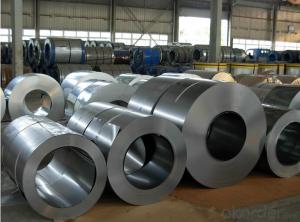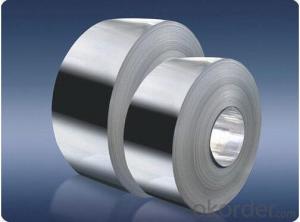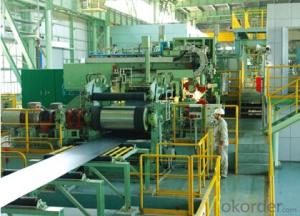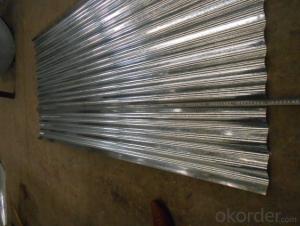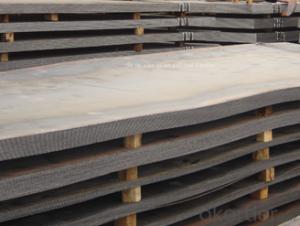Best Quality of Cold Rolled Steel Coil from China
- Loading Port:
- Tianjin
- Payment Terms:
- TT OR LC
- Min Order Qty:
- 100 m.t.
- Supply Capability:
- 5000 m.t./month
OKorder Service Pledge
OKorder Financial Service
You Might Also Like
1.Structure of Cold Rolled Steel Description:
The raw material of cold rolled steel coil/sheet is high quality hot rolled product, and after pickling continuous rolling, degreasing, annealing,skin pass,slitting and cut to length line etc. Along with it many kinds of new technology and new process of global cold rolling production have been applied. Therefore the quality of the goods could be guaranteed. The product is widely used in outdoor and interior decoration, furnishing manufacturing, home appliance, automobile etc.
2.Main Features of the Cold Rolled Steel:
• Excellent process capability
• Smooth and flat surface
• Workability, durability
• Excellent heat resistance performance
• High strength
• Good formability
• Good visual effect
3.Cold Rolled Steel Images
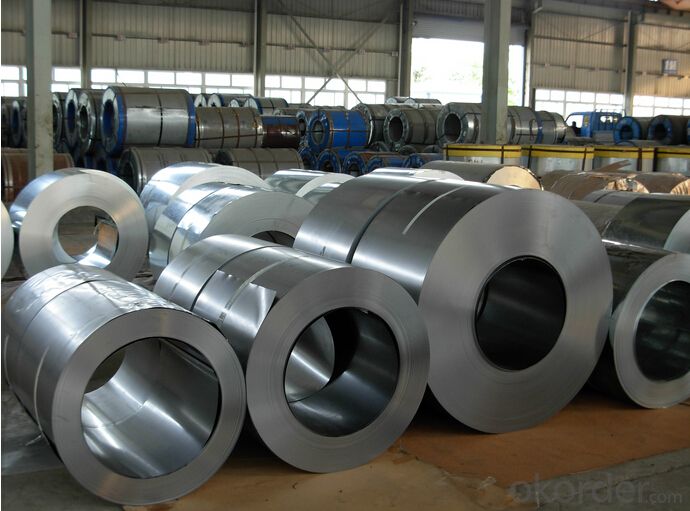
4.Cold Rolled Steel Specification
Standard:AISI,ASTM,DIN,GB,JIS,JIS G3302 ASTM 653M EN10142
Grade: Q195~Q345
Thickness: 0.16mm~1.5mm,0.16-1.5mm
Width: 1250,600-1250mm
Coil weight:3-12 MT
Coil ID:508/610mm
Chemical composition:
C | Si | Mn | Cr | Ni | P | S |
0.150 | 0.476 | 11.231 | 12.50 | 0.900 | 0.039 | 0.010
|
5.FAQ of Cold Rolled Steel
We have organized several common questions for our clients,may help you sincerely:
1.How about your company?
A world class manufacturer & supplier of castings forging in carbon steel and alloy steel,is one of the large-scale professional investment casting production bases in China,consisting of both casting foundry forging and machining factory. Annually more than 8000 tons Precision casting and forging parts are exported to markets in Europe,America and Japan. OEM casting and forging service available according to customer’s requirements.
2.How to guarantee the quality of the products?
We have established the international advanced quality management system,every link from raw material to final product we have strict quality test;We resolutely put an end to unqualified products flowing into the market. At the same time, we will provide necessary follow-up service assurance.
3. How long can we receive the product after purchase?
Usually within thirty working days after receiving buyer’s advance payment or LC. We will arrange the factory manufacturing as soon as possible. The cargo readiness usually takes 15-25 days, but the shipment will depend on the vessel situation.
- Q:How do steel sheets perform in harsh chemical environments?
- Steel sheets generally perform well in harsh chemical environments due to their corrosion resistance properties. Steel is an alloy primarily composed of iron, with the addition of other elements such as carbon, chromium, and nickel. These additional elements enhance the steel's resistance to corrosion, making it suitable for use in environments where exposure to harsh chemicals is expected. Steel sheets are often coated with protective layers such as zinc or epoxy, which provide an extra barrier against corrosive substances. These coatings act as a sacrificial layer, corroding in place of the underlying steel and extending the material's lifespan. In addition to the coatings, steel sheets can also be treated through processes like galvanization, where a layer of zinc is applied to the surface, further enhancing their resistance to chemical corrosion. However, it is important to note that the performance of steel sheets in harsh chemical environments can vary depending on the specific chemicals involved. Some chemicals may be highly corrosive to steel, particularly if they are highly acidic or contain aggressive substances. In such cases, specialized stainless steel alloys or other materials may be more suitable. Overall, steel sheets are widely used in harsh chemical environments due to their durability and resistance to corrosion. However, proper selection of the specific steel alloy, coatings, and additional protection measures is crucial to ensure optimal performance and longevity in these challenging environments.
- Q:Are steel sheets resistant to corrosion?
- Yes, steel sheets are generally resistant to corrosion due to the protective layer formed by the presence of chromium.
- Q:Are steel sheets suitable for automotive applications?
- Yes, steel sheets are suitable for automotive applications. They are commonly used in the automotive industry due to their high strength, durability, and affordability. Steel sheets provide structural integrity and crash protection in automobiles, making them a preferred choice for various automotive components such as body panels, chassis, and reinforcements.
- Q:What are steel sheets used for?
- Steel sheets are commonly used for various applications such as construction, manufacturing, automotive, and aerospace industries. They are utilized in building structures, roofing, cladding, and fabrication of machinery, equipment, and vehicles. Additionally, steel sheets can be used for making appliances, electrical enclosures, storage tanks, and many other industrial and commercial purposes.
- Q:What are the color options for steel sheets?
- The color options for steel sheets can vary depending on the specific treatment or coating applied to the surface. Some common color options include plain steel (silver-gray), black, white, red, blue, green, and various metallic finishes such as bronze or copper. Additionally, steel sheets can be painted or coated with custom colors to suit specific design or aesthetic preferences.
- Q:Can steel sheets be used for industrial machinery parts?
- Yes, steel sheets can be used for industrial machinery parts. Steel sheets are commonly used in the manufacturing of industrial machinery parts due to their strength, durability, and versatility. They can be easily cut, bent, and formed into various shapes to meet the specific requirements of different machinery components. Additionally, steel sheets offer excellent resistance to wear, corrosion, and heat, making them suitable for use in demanding industrial environments.
- Q:What is the hardness of the steel sheets?
- The hardness of steel sheets can vary depending on the specific grade and treatment of the steel. Steel sheets are typically measured on the Rockwell hardness scale, which measures the resistance of the material to indentation. The hardness of steel sheets can range from relatively soft to extremely hard, depending on factors such as the carbon content, alloying elements, and heat treatment processes used during manufacturing. It is important to consider the intended application and desired properties when selecting steel sheets, as the hardness can affect factors such as wear resistance, strength, and machinability.
- Q:Are the steel sheets susceptible to rusting?
- Yes, steel sheets are susceptible to rusting as steel is prone to corrosion when exposed to moisture and oxygen.
- Q:Can steel sheets be used for soundproofing purposes?
- Yes, steel sheets can be used for soundproofing purposes. Steel is a dense and rigid material that effectively blocks the transmission of sound waves. When used in soundproofing applications, steel sheets can help reduce the amount of sound that passes through walls, floors, or ceilings. They can be installed as a barrier or added as an additional layer to existing structures to increase their soundproofing capabilities. However, it is important to note that steel sheets alone may not provide complete soundproofing, as sound can still travel through other pathways such as windows or doors. Therefore, a comprehensive soundproofing strategy may involve combining steel sheets with other sound-absorbing materials, such as acoustic foam or insulation, to achieve optimal results.
- Q:How is the quality of steel sheets determined?
- The quality of steel sheets is determined by several factors and tests. One of the primary factors is the chemical composition of the steel, which includes the presence and percentage of various elements such as carbon, manganese, silicon, and alloying elements like chromium, nickel, and molybdenum. The specific composition affects the steel's strength, durability, and resistance to corrosion. Another important aspect is the mechanical properties of the steel, which are assessed through tests such as tensile strength, yield strength, elongation, hardness, and impact resistance. These tests help determine the steel's ability to withstand applied forces and deformation without failure. Surface quality is also crucial in determining the quality of steel sheets. The surface should be free from defects like cracks, scratches, pits, or any other irregularities that could affect the performance or appearance of the steel. Furthermore, the thickness and uniformity of the steel sheets are crucial factors. Thickness is measured using methods like ultrasonic gauges or micrometers to ensure compliance with the required specifications. Any deviations from the specified thickness can affect the structural integrity and performance of the steel sheets. Additionally, the steel sheets undergo various tests to assess their weldability, formability, and machinability, which determine their suitability for specific applications. These tests help evaluate the steel's behavior during fabrication processes like welding, bending, or machining. Overall, the quality of steel sheets is determined by a comprehensive evaluation of their chemical composition, mechanical properties, surface quality, thickness, and other specific performance characteristics. These assessments ensure that the steel sheets meet the required standards and are suitable for the intended applications.
1. Manufacturer Overview |
|
|---|---|
| Location | |
| Year Established | |
| Annual Output Value | |
| Main Markets | |
| Company Certifications | |
2. Manufacturer Certificates |
|
|---|---|
| a) Certification Name | |
| Range | |
| Reference | |
| Validity Period | |
3. Manufacturer Capability |
|
|---|---|
| a)Trade Capacity | |
| Nearest Port | |
| Export Percentage | |
| No.of Employees in Trade Department | |
| Language Spoken: | |
| b)Factory Information | |
| Factory Size: | |
| No. of Production Lines | |
| Contract Manufacturing | |
| Product Price Range | |
Send your message to us
Best Quality of Cold Rolled Steel Coil from China
- Loading Port:
- Tianjin
- Payment Terms:
- TT OR LC
- Min Order Qty:
- 100 m.t.
- Supply Capability:
- 5000 m.t./month
OKorder Service Pledge
OKorder Financial Service
Similar products
New products
Hot products
Related keywords
